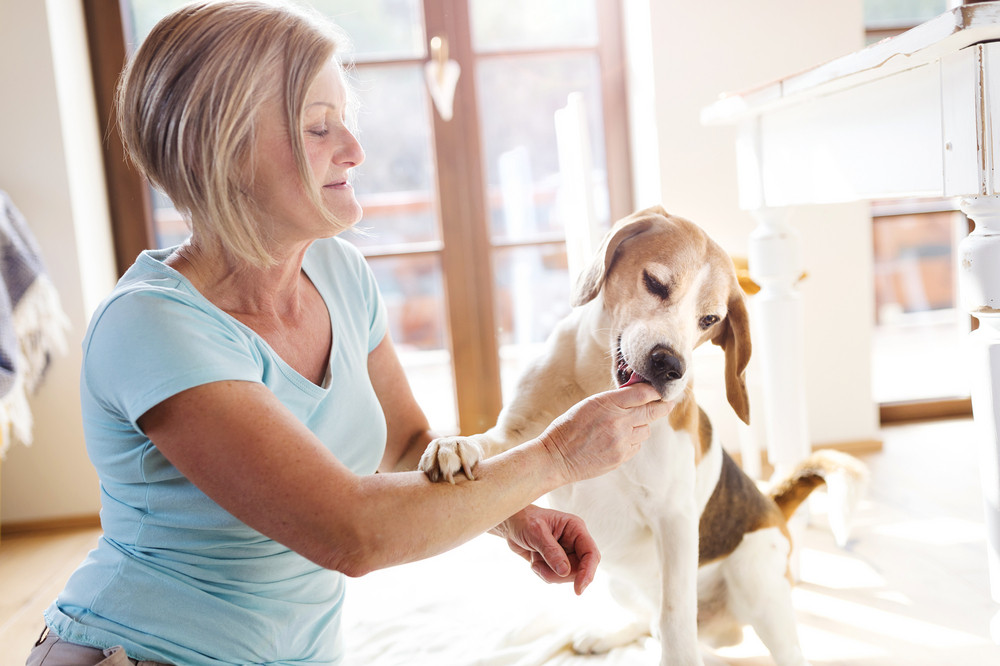
What You Should Do If Your Dog Develops Arthritis

There’s no question that Americans love their dogs. In fact, 44% of U.S. households have a dog. At the end of a long day of work, there’s nothing quite like opening the door to see a happy face and a wagging tail.
As much as we love our furry friends, one of the hardest things to deal with is watching your beloved canine companion grow old. Old age means there’s a good chance your dog could develop arthritis. It’s a condition that affects one out of every four dogs.
If you’re got a dog that’s getting on in age, don’t panic. More than 75% of dogs that develop arthritis and severe dysplasia can live happy and live comfortably with proper care.
Your dog may have arthritis if you notice any of the following symptoms:
- Your dog seems to be favoring a limb when sitting or walking
- Your dog is slow to get up
- Your dog doesn’t play as often as they used to
- Your dog is laying down more or sleeping more
- Your dog is either slow or hesitant to do basic things such as running or jumping that were previously not an issue
If you notice any of these things, you should consider a trip to the vet’s office, but there are also things you can do at home to help an elderly dog:
- Braces: Statistics have shown that one in four adult dogs develops arthritis. One thing that can help an elderly dog is a dog arthritis brace. A dog arthritis brace or a mobility brace, helps to add stability to joints that may be weak or damaged due to arthritis. Understand that a dog arthritis brace isn’t a cure-all for helping your dog, but it can do a lot to relieve your pooch of pain they might be feeling and help them be more mobile than maybe they have been in awhile.
Depending on the company, you can find knee braces, hip braces, dog wraps compression sleeves and carpal support braces depending on what you’re looking for. - Supplements: Another way to help your furry friend is by giving them nutritional supplements designed to promote joint health in elderly dogs. Your vet can likely point you toward approved supplements and you can buy ones that can be given to your dog daily. Different supplements work differently depending on the dog, so be sure to consult with your vet before you give your dog anything.
- Holistic medicine: If you want a more holistic approach to helping your dog, there are plenty of options available. One of the best things you can do is to take your canine for a walk. Most dogs benefit daily aerobic exercise and at least a 30-minute walk. At the mere mention of a walk, it’s likely that your dog gets excited at the chance to enjoy some fresh air. Taking them out will help with any joint stiffness and will help prevent weight gain.
When it comes to caring for arthritic dogs or elderly dogs, there are also several everyday changes you can make it make life easier for your dog:
- Maintain a regular exercise schedule; maybe take them for a walk at the same time every day.
- Make sure they have a soft, supportive bed (like a therapeutic dog bed or therapeutic pet mat) so they’re comfortable when they lay down.
- Put down some carpet or rugs if you have hardwood flooring to help prevent slipping.
- Raise their food and water bowls up from the floor so there’s less of a strain on their neck.
- Keep their nails trimmed so their not uncomfortable when they walk.
If you’ve got an elderly dog or a dog dealing with arthritis, there are many simple things you can do to help improve their quality of life. Keeping them active and monitoring their nutrition can keep them healthy and items such as a dog arthritis brace, holistic medicine and nutritional supplements can keep your dog both mobile and comfortable. If you notice any potential signs of arthritis in your dog, visit your local vet immediately and have them guide you on what steps to take.